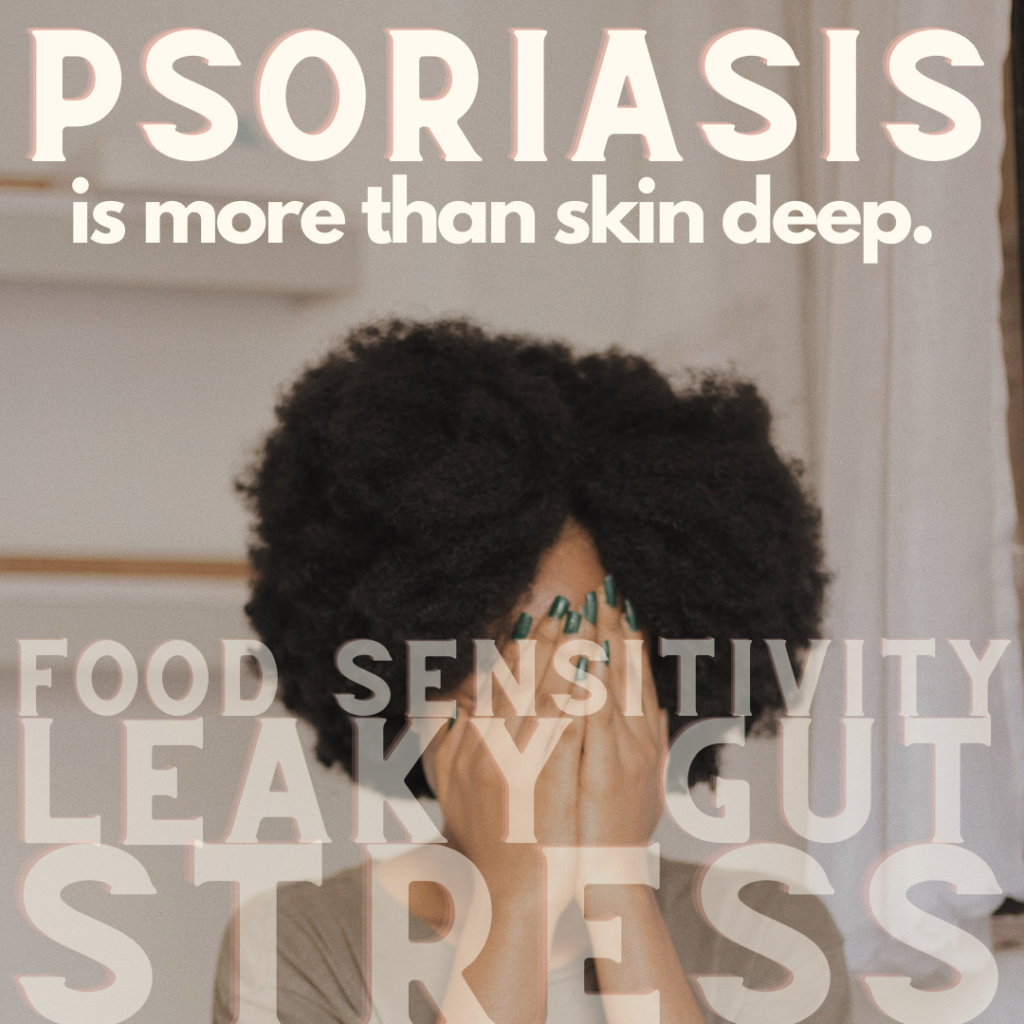
by Cassie Irwin, ND
What is psoriasis?
Psoriasis is an inflammatory, autoimmune condition that most often presents as a red, scaly skin rash. But it can also cause inflammation elsewhere in the body and result in psoriatic joint pain. If you are dealing with psoriasis, you know the toll it can take on your self esteem when you’re at the beach. And if you’ve experienced a progression of the disease through the years, you’re familiar with how psoriasis can impact your day-to-day activities.
While pharmaceuticals are helpful to manage symptoms and control the disease process, it is also helpful to look under the surface at potential causes of and contributors to psoriasis. Many people with psoriasis have a genetic predisposition to developing the disease, but there are also lifestyle and environmental contributors to psoriasis. Once those are identified, you can tweak your diet and lifestyle practices to support your body’s ability to keep your psoriasis in check.
1. FOOD SENSITIVITES
Unlike food allergies, which cause an immediate response in the body, oftentimes food sensitivities present more slowly. This means that we tend to continue eating foods to which we are sensitive because the immune response is slower and can even take days or weeks to cause symptoms. This makes it difficult to pinpoint what food is making you feel unwell.
Food sensitivities encourage inflammation and autoimmunity, both of which play a role in psoriasis. Add to that, gastrointestinal inflammation hinders your ability to properly absorb many of the nutrients needed for immune modulation and skin healing, such as vitamin D, omega 3s, vitamin C, zinc and collagen.
SYMPTOMS OF FOOD SENSITIVITY:
- Joint pain
- Brain fog
- Autoimmune diseases
- Painful periods
- Bloating
- Diarrhea
- Constipation
- Skin rashes
- Headaches
When it comes to food sensitivities and psoriasis, there is a correlation with celiac disease. But even if you’ve had a negative celiac test, the body can still have a problem with gluten in a different sort of way. This is known as “Non Celiac Gluten Sensitivity.” (NCGS). Psoriasis is one of the most commonly associated autoimmune disorders associated with NCGS. Regardless of whether you’ve been diagnosed as celiac, it may be helpful to do a trial gluten-free diet and assess any change in your psoriasis.
Aside from gluten, food sensitivities can be very individual, with one person having a problem with strawberries, while their neighbour may have a problem with dairy. Eliminating your individual food sensitivities can be helpful for reducing your body’s inflammatory response as a way to minimize psoriasis severity.
Ask your Naturopathic Doctor about IgG Food Sensitivity testing to identify unknown sensitivities which could be contributing to your psoriasis.
SUPPLEMENTS TO HELP REDUCE FOOD SENSITIVITY SYMPTOMS:
- Betaine HCl
- Full spectrum digestive enzymes
- Ox bile
- Peppermint oil
- Wobenzyme
2. LEAKY GUT
In scientific circles, “Leaky Gut” is known as Intestinal Hyperpermeability. In perfect conditions, the intestines are able to maintain balance between letting certain favorable particles into the body (ie, nutrients), while keeping other particles out (ie, toxins, bad microbes, undigested food).
But this delicate balance is often challenged by gluten, small intestinal bacteria, food additives and NSAIDs like ibuprofen and aspirin. This results in a “leaky gut”. Intestinal hyperpermeability is associated with the development of autoimmunity in genetically susceptible individuals. Identifying whether or not you have a leaky gut can be helpful in identifying it as a potential contributor to your psoriasis.
You can find out if you might have a leaky gut with a simple blood test called zonulin. Zonulin is a protein involved in regulating the tight junctions between intestinal cells, which dictates the gut’s permeability. Ask your ND about testing for zonulin in the blood and assessing your microbiome with a comprehensive stool test.
Fixing a leaky gut might involve identifying and eliminating food sensitivities, correcting the microbiome after identifying which microbes are overgrown or deficient, reducing inflammation, supplementing for low stomach acid and bile acids, and providing the gut with the right building blocks for healing its lining.
SUPPLEMENTS FOR LEAKY GUT:
- L-glutamine
- Butyrate
- Aloe vera gel or juice
- Marshmallow tea
- boulardii probiotic yeast
- Reishi
3. STRESS
If you have psoriasis, you’ve likely observed that your rashes get worse when you’re stressed. You also likely know firsthand that having psoriasis adds to the stress in your life. Cue a vicious circle!
Research suggests that emotional stress may influence the development and exacerbation of psoriasis. From these observations, researchers have theorized that stress can worsen psoriasis severity and even delay its healing. Because of this, psychotherapy can be helpful to help reduce stress associated with psoriasis.
Dysregulation in the Hypothalamic-Pituitary-Adrenal Axis (HPA Axis) is proposed as the mediator of stress-induced aggravations in psoriasis. Commonly known as “Adrenal Fatigue,” HPA Axis dysfunction often presents as stress, anxiety, depression, fatigue, irritability and insomnia. We see this happen after a period of prolonged stress and leading a hectic lifestyle without enough downtime.
A properly functioning HPA Axis helps you feel equipped to handle stressors, go to sleep easily and wake refreshed, and feel more like yourself. Simple practices including rising and sleeping at the same time every day, eating meals at the same time every day, getting outside for sunshine, and sleeping in complete darkness are fundamental for healthy HPA Axis functioning.
SUPPLEMENTS FOR STRESS:
- B vitamin complex
- Magnesium bisglycinate
- Vitamin C
- Adaptogenic herbs

Dr. Cassie Irwin, ND
Naturopathic Contributor, The Peanut Mill Natural Foods Market
Dr. Cassie Irwin, ND helps high-performing women quell anxiety, exhaustion, and overwhelm so they can wield their superpowers while feeling calm, productive, and aligned. Dr. Cassie consults virtually and in her Niagara Falls practice. www.drcassieirwin.com; @drcassieirwin
Works Cited
Bhatia BK, Millsop JW, Debbaneh M, Koo J, Linos E, Liao W. Diet and psoriasis, part II: celiac disease and role of a gluten-free diet. J Am Acad Dermatol. 2014;71(2):350-358. doi:10.1016/j.jaad.2014.03.017
Boehncke WH, Schön MP. Psoriasis. Lancet. 2015 Sep 5;386(9997):983-94. doi: 10.1016/S0140-6736(14)61909-7. Epub 2015 May 27. PMID: 26025581.
Dwivedi, M., Kumar, P., Laddha, N. C., & Kemp, E. H. (2016). Induction of regulatory T cells: A role for probiotics and prebiotics to suppress autoimmunity. Autoimmunity Reviews, 15(4), 379–392. doi: 10.1016/j.autrev.2016.01.002 http://eds.a.ebscohost.com.proxy.library.brocku.ca/eds/detail/detail?vid=3&sid=1c260e8c-2ccc-4808-ab87-8664e11f9a8c%40sdc-v-sessmgr01&bdata=JnNpdGU9ZWRzLWxpdmUmc2NvcGU9c2l0ZQ%3d%3d#AN=S1568997216000033&db=edselp
Heller MM, Lee ES, Koo JY. Stress as an influencing factor in psoriasis. Skin Therapy Lett. 2011 May;16(5):1-4. PMID: 21611682.
Humbert P, Bidet A, Treffel P, Drobacheff C, Agache P. Intestinal permeability in patients with psoriasis. J Dermatol Sci. 1991 Jul;2(4):324-6. doi: 10.1016/0923-1811(91)90057-5. PMID: 1911568.
Irwin, M. R., & Opp, M. R. (2016). Sleep Health: Reciprocal Regulation of Sleep and Innate Immunity. Neuropsychopharmacology, 42(1), 129–155. doi: 10.1038/npp.2016.148 https://www.ncbi.nlm.nih.gov/pmc/articles/PMC5143488/
Korman NJ. Management of psoriasis as a systemic disease: what is the evidence? Br J Dermatol. 2020 Apr;182(4):840-848. doi: 10.1111/bjd.18245. Epub 2019 Oct 15. PMID: 31225638; PMCID: PMC7187293.
Losurdo G, Principi M, Iannone A, Amoruso A, Ierardi E, Di Leo A, Barone M. Extra-intestinal manifestations of non-celiac gluten sensitivity: An expanding paradigm. World J Gastroenterol. 2018 Apr 14;24(14):1521-1530. doi: 10.3748/wjg.v24.i14.1521. PMID: 29662290; PMCID: PMC5897856.
Olsson, L., Ahlbom, A., Grill, V., Midthjell, K., & Carlsson, S. (2012). Sleep disturbances and low psychological well-being are associated with an increased risk of autoimmune diabetes in adults. Results from the Nord-Trøndelag Health Study. Diabetes Research and Clinical Practice, 98(2), 302–311. doi: 10.1016/j.diabres.2012.09.011 https://www.diabetesresearchclinicalpractice.com/article/S0168-8227(12)00315-4/fulltext
Miller, F. W., Alfredsson, L., Costenbader, K. H., Kamen, D. L., Nelson, L. M., Norris, J. M., & Roos, A. J. D. (2012). Epidemiology of environmental exposures and human autoimmune diseases: Findings from a National Institute of Environmental Health Sciences Expert Panel Workshop. Journal of Autoimmunity, 39(4), 259–271. doi: 10.1016/j.jaut.2012.05.002 https://www.ncbi.nlm.nih.gov/pmc/articles/PMC3496812/
Vasquez, A. (2014). Reply to “Role of Western Diet in Inflammatory Autoimmune Diseases” by Manzel et al. in Current Allergy and Asthma Reports (Volume 14, Issue 1, January 2014). Current Allergy and Asthma Reports, 14(8). doi: 10.1007/s11882-014-0454-4 https://www.ncbi.nlm.nih.gov/pmc/articles/PMC4034518/

